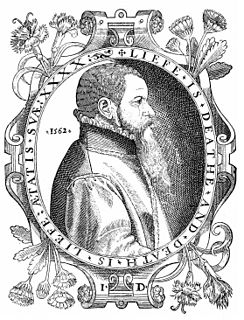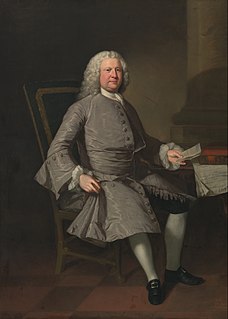Common Era (CE) is one of the notation systems for the world's most widely used calendar era. BCE is the era before CE. BCE and CE are alternatives to the Dionysian BC and AD system respectively. The Dionysian era distinguishes eras using AD and BC. Since the two notation systems are numerically equivalent, "2020 CE" corresponds to "AD 2020" and "400 BCE" corresponds to "400 BC". Both notations refer to the Gregorian calendar. The year-numbering system used by the Gregorian calendar is used throughout the world today, and is an international standard for civil calendars.

Merriam-Webster, Inc., is an American company that publishes reference books and is especially known for its dictionaries.

Bernard Quaritch, full name Bernard Alexander Christian Quaritch, was a German-born British bookseller and collector.
Thomas Digges was an English mathematician and astronomer. He was the first to expound the Copernican system in English but discarded the notion of a fixed shell of immoveable stars to postulate infinitely many stars at varying distances. He was also first to postulate the "dark night sky paradox".

Humphrey Prideaux was an Cornish churchman and orientalist, Dean of Norwich from 1702. His sympathies inclined to Low Churchism in religion and to Whiggism in politics.

John Day was an English Protestant printer. He specialised in printing and distributing Protestant literature and pamphlets, and produced many small-format religious books, such as ABCs, sermons, and translations of psalms. He found fame, however, as the publisher of John Foxe's Actes and Monuments, also known as the Book of Martyrs, the largest and most technologically accomplished book printed in sixteenth-century England.
Henry Denham was one of the outstanding English printers of the sixteenth century.
Henry Bynneman, was an English printer of the 16th century.
Luke Foxe was an English explorer, born in Kingston-upon-Hull, Yorkshire, who searched for the Northwest Passage across North America. In 1631, he sailed much of the western Hudson Bay before concluding no such passage was possible. Foxe Basin, Foxe Channel and Foxe Peninsula were named after him.
Richard Tottel was an English publisher and influential member of the legal community. He ran his business from a shop located at Temple Bar on Fleet Street in London. The majority of his printing was centered on legal documents, but he is most known for a collection he edited and published in 1557 called Songes and Sonnettes.
Andrew Crooke and William Cooke were London publishers of the mid-17th-century. In partnership and individually, they issued significant texts of English Renaissance drama, most notably of the plays of James Shirley.
Nicholas Okes was an English printer in London of the Jacobean and Caroline eras, remembered for printing works of English Renaissance drama. He was responsible for early editions of works by many of the playwrights of the period, including William Shakespeare, Ben Jonson, John Webster, Thomas Middleton, Thomas Dekker, Thomas Heywood, James Shirley, and John Ford.
John Waterson was a London publisher and bookseller of the Jacobean and Caroline eras; he published significant works in English Renaissance drama, including plays by William Shakespeare, John Fletcher, John Webster, and Philip Massinger.
William Leake, father and son, were London publishers and booksellers of the late sixteenth and the seventeenth centuries. They were responsible for a range of texts in English Renaissance drama and poetry, including works by Shakespeare and Beaumont and Fletcher.

William Barley (1565?–1614) was an English bookseller and publisher. He completed an apprenticeship as a draper in 1587, but was soon working in the London book trade. As a freeman of the Drapers' Company, he was embroiled in a dispute between it and the Stationers' Company over the rights of drapers to function as publishers and booksellers. He found himself in legal tangles throughout his life.
Alexander Gill the Elder, also spelled Gil, was an English scholar, spelling reformer, and high-master of St Paul's School, where his pupils included John Milton. He was the author of an English grammar, which was written, however, in Latin.

Thomas Vautrollier or Vautroullier was a French Huguenot refugee who became a printer in England and, briefly, in Scotland.
James Roberts, was an English printer who printed many important works of Elizabethan literature. F. G. Fleay says that "he seems to have been given to piracy and invasion of copyright".
Edward White was a London printer and stationer whose career spanned a period of over forty years. His shop in the booksellers' district of St Paul's Churchyard was at the Sign of the Gun, where he sold many anonymous works as well as works by Thomas Kyd, Robert Greene, Anthony Munday and Christopher Marlowe. Between 1594 and 1611 he sold all three quartos of William Shakespeare's Titus Andronicus.

Thomas Osborne was an English publisher and bookseller noted for his association with author Samuel Johnson and his purchase of the library of Edward Harley, 2nd Earl of Oxford.






